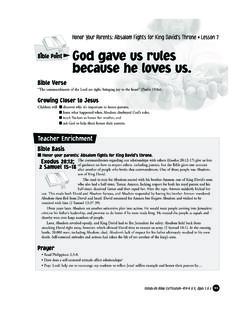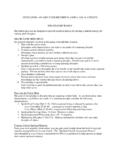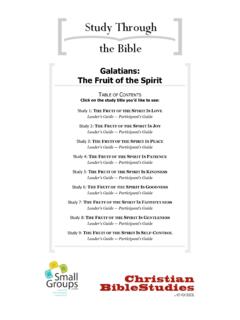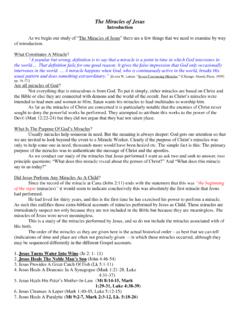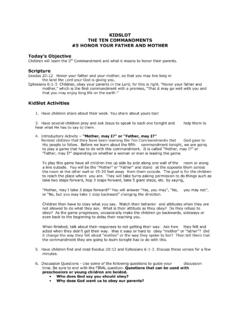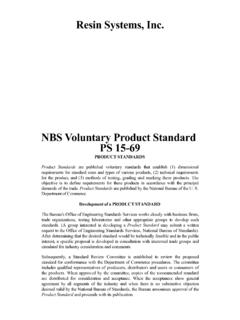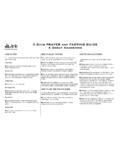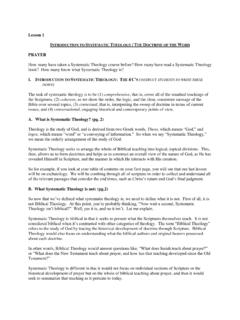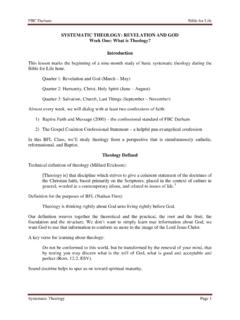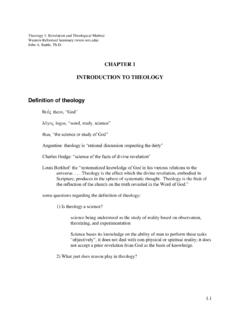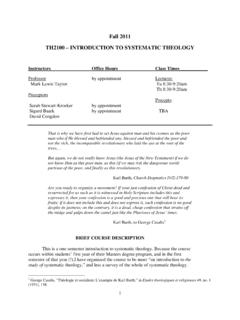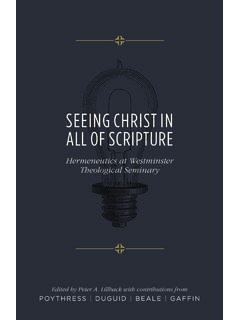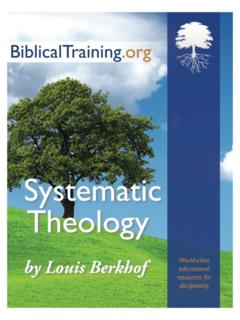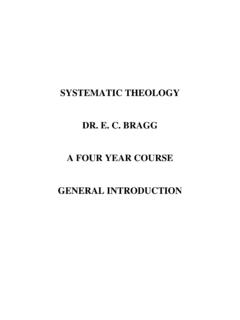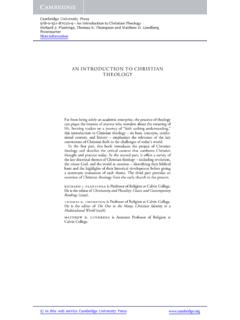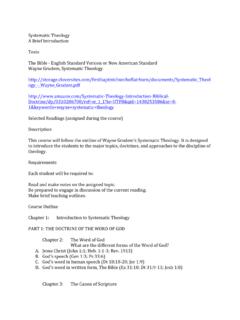Transcription of Theology 101 - Clover Sites
1 1 Theology 101qClick on a study title you d like to see q 2009 Christianity Today International Through the Bible261938506879 INTRODUCTIONS tudy 1: The DOCTRINe Of The BIBle Leader s Guide Participant s Guide Study 2: The DOCTRINe Of GOD Leader s Guide Participant s GuideStudy 3: The DOCTRINe Of MaNkIND Leader s Guide Participant s Guide Study 4: The DOCTRINe Of ChRIST aND SalvaTION Leader s Guide Participant s GuideStudy 5: The DOCTRINe Of The hOly SpIRIT aND The ChURCh Leader s Guide Participant s Guide Study 6: The DOCTRINe Of The fUTURe Leader s Guide Participant s Guide 2009 Christianity Today International 101 IntroductionDefinitionsThe word Theology is derived from two Greek words:* Theos (God)* Logos (speech or reason)Therefore, Theology in its simplest terms is rational discussion about God.
2 In Greek, the word theologia referred to discussions amongst the philosophers about divine matters. Plato called the stories of the gods theologies. Aristotle considered Theology to be the greatest of all scientific studies since its subject, God, was the highest reality. Mark Batterson would echo Aristotle s thoughts in his claim that every -ology is a branch of Theology . B. B. Warfield promoted a classic definition as follows: Theology is the science of God and his relationship to man and the world. In greater detail, it is the discipline which 1) presents a unified formulation of truth concerning God and his relationship to humanity and the universe as this is set forth in divine revelation; and 2) applies such truths to the entire range of human thought and life.
3 (Evangelical Dictionary of Theology ) Theology : the contents of the Christian faith as set forth in orderly exposition by the Christian community. (Renewal Theology , J. Rodman Williams) Theology : the attempt to reduce religious truth to an organized system. (Evangelical Dictionary of Theology )Systematic Theology : any study that answers the question, What does the whole Bible teach us today? This definition indicates that systematic Theology involves collecting and Then we will no longer be immature like children. We won t be tossed and blown about by every wind of new teaching. We will not be influenced when people try to trick us with lies so clever they sound like the truth.
4 Instead, we will speak the truth in love, growing in every way more and more like Christ, who is the head of his body, the church. Ep hE s i a n s 4:14 15, nLT 2009 Christianity Today International 101 Introductionunderstanding all the relevant passages in the Bible on various topics and then summarizing their teachings clearly so that we know what to believe about each topic. (Bible Doctrine, Wayne Grudem)Doctrine: What the whole Bible teaches about some particular topic. (Bible Doctrine, Wayne Grudem)Major Doctrine: one that has a significant impact on our thinking about other doctrines or that has a significant impact on how we live the Christian life (examples: authority of the Bible, deity of Christ, justification by faith).
5 Minor Doctrine: one that has very little impact on how we think about other doctrines and very little impact on how we live the Christian life (examples: differing views of the future, forms of church government, forms of communion and baptism).Paradox: a seemingly contradictory statement that may nonetheless be true (example: the doctrine of the Trinity). Other DisciplinesBiblical Theology : historical development of Theology throughout Scripture. Historical Theology : study of Christian doctrines as they have been considered at different points in church Theology : a study of theological topics largely without the use of the Bible. Instead, philosophical tools, resources, and methods are used to organize theological thought (example: Paul Tillich s Systematic Theology ).
6 Narrative Theology : a 20th-century development of theological thought predicated on the idea that the Bible should be considered as narrative more than a system of theological truth. Dogmatic Theology : a study of Theology as set forth in the creeds, dogmas, and pronouncements of the : a defense of the Christian faith for the purpose of instructing believers or convincing : the application of God s Word to real life situations, problems, and questions. 2009 Christianity Today International 101 IntroductionThree Sources of Authority* Biblical* Traditionalist* Subjectivist Initial Presuppositions Presupposition: an assumption that forms the beginning point of any study.
7 * The Bible is true and is the absolute standard of truth.* The God of the Bible exists, and he is who the Bible says he is. Why Study Theology ? It was he who gave some to be apostles, some to be prophets, some to be evangelists, and some to be pastors and teachers, to prepare God s people for works of service, so that the body of Christ may be built up until we all reach unity in the faith and in the knowledge of the Son of God and become mature, attaining to the whole measure of the fullness of Christ. Then we will no longer be infants, tossed back and forth by the waves, and blown here and there by every wind of teaching and by the cunning and craftiness of men in their deceitful scheming.
8 Instead, speaking the truth in love, we will in all things grow up into him who is the Head, that is, Christ. From him the whole body, joined and held together by every supporting ligament, grows and builds itself up in love, as each part does its work. (Ephesians 4:11 16) Anyone who lives on milk, being still an infant, is not acquainted with the teaching about righteousness. But solid food is for the mature, who by constant use have trained themselves to distinguish good from evil. (Hebrews 5:13 14)* Clarification (Ephesians 4:14)* Correction (1 Timothy 1:3; 2 Timothy 4:3 5; Hebrews 5:13 14) * Declaration and Unification (Ephesians 4:13)* Obedience (Psalm 119:11; Matthew 28:19 20; 1 John 2:3)* Growth (Ephesians 4)* To love and glorify God (Matthew 22:37; Philippians 1:9 11)How Should We Study Theology ?
9 2009 Christianity Today International 101 introduction * Biblically (2 Timothy 3:16 17)* Guided by the Holy Spirit (John 14:17; 16:13)* Humbly (2 Timothy 2:23 25; 1 Peter 5:5; James 1:19 20)* With discernment (1 Corinthians 2:14; Ephesians 1:17 19)* In community (Proverbs 11:14; 1 Corinthians 12:27 28)* Prayerfully (Psalm 119:18)* With application to life (1 Timothy 6:3; Titus 2:1)* With reference to church history (context and perspective)* With worship and praise (Deuteronomy 6:1 9; Psalm 119:14, 103, 111, 162)The Theology books that are quoted throughout this study are: * Bible Doctrine, Wayne Grudem, Zondervan (July 1, 1999). Bible Doctrine takes a highly commended upper-level textbook on systematic Theology and makes it accessible to the average reader.
10 Abridged from Wayne Grudem s award-winning Systematic Theology , Bible Doctrine covers the same essentials of the faith, giving you a firm grasp on seven key topics.* Theology for the Community of God, Stanley Grenz, Wm. B. Eerdmans Publishing Company (2000). Stanley Grenz presents the traditional themes of Christian doctrine within an emphasis on God s central program for creation, namely, the establishment of community. Masterfully blending biblical, historical, and contemporary concerns, Grenz s respected work provides a coherent vision of the faith that is both intellectually satisfying and expressible in Christian living.* evangelical Dictionary of Theology , ed.

